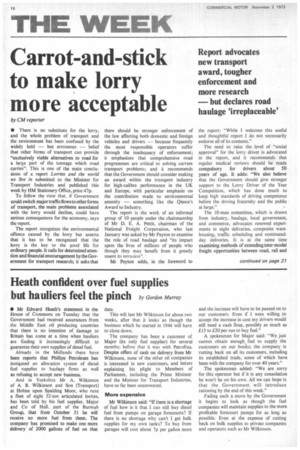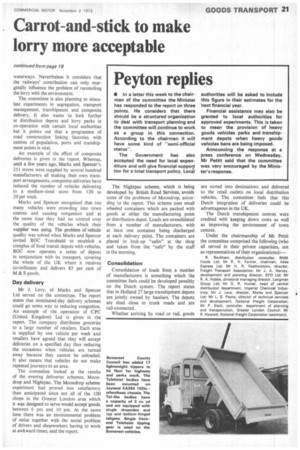Carrot-and-stick to make lorry more acceptable
Page 20

Page 23

If you've noticed an error in this article please click here to report it so we can fix it.
by CM reporter
• There is no substitute for the lorry, and the whole problem of transport and the environment has been confused by the widely held — but erroneous — belief that other forms of transport can provide "exclusively viable alternatives to road for a large part of the tonnage which road carries". This is one of the main conclusions of a report Lorries and the world we live in submitted to the Minister for Transport Industries and published this week by HM Stationery Office, price 47p.
To follow the view that. if Government could switch major traffic flows to other forms of transport, the main problems associated with the lorry would decline, could have serious consequences for the economy, says the report.
The report recognizes the environmental offence caused by the lorry but asserts that it has to be recognized that the lorry is the key to the good life for ordinary people. It calls for determined attention and financial encouragement by the Government for transport research; it asks that there should be stronger enforcement of the law affecting both domestic and foreign vehicles and drivers — because frequently the most responsible operators suffer through the inadequacy of enforcement; it emphasizes that comprehensive road programmes are critical to solving current transport problems; and it recommends that the Government should consider making an award within the transport industry for high-calibre performance in the UK and Europe, with particular emphasis on the contribution made to environmental amenity — something like the Queen's Award to Industry.
The report is the work of an informal group of 10 people under the chairmanship of Mr D. E. A. Pettit, chairman of the National Freight Corporation, who last January was asked by Mr Peyton to examine the role of road haulage and "its impact upon the lives of millions of people who though they may benefit from it greatly resent its intrusion".
Mr Peyton adds, in the foreword to the report: "While I welcome this useful and thoughtful report I do not necessarily endorse all of its contents."
The need to raise the level of "social approval" for the lorry driver is advocated in the report, and it recommends that regular medical reviews should be made compulsory for drivers about 50 years of age. It adds: "We also believe that the Government should give stronger support to the Lorry Driver of the Year Competition, which has done much to • keep high standards of driving competence before the driving fraternity and the public at large."
The 10-man committee, which is drawn from industry, haulage, local government, and commerce, advocates renewed experiments in night deliveries, composite warehousing, traffic scheduling and nominatedday deliveries. It is at the same time examining methods of extending inter-modal freight opportunities between road, rail and
The Nightpac scheme, which is being developed by British Road Services, avoids some of the problems of Moondrop, according to the report. This scheme uses small wheeled containers which are packed with goods at either the manufacturing point or distribution depot. Loads are consolidated from a number of manufacturers, with at least one container being discharged at each delivery point. The containers are placed in lock-up "safes" at the shop and taken from the "safe" by the staff in the morning.
Consolidation Consolidation of loads from a number of manufacturers is something which the committee feels could be developed possibly on the Dutch system. The report states that in Holland 27 large transhipment depots are jointly owned by hauliers. The depots are sited close to trunk roads and are rail-connected.
Whether arriving by road or rail, goods arc sorted into destinations and delivered to the retail outlets on local distribution vehicles. The committee feels that this Dutch integration of deliveries could be advantageous in the UK.
The Dutch transhipment centres were credited with keeping down costs as well as improving the environment of town centres.
Under the chairmanship of Mr Pettit the committee comprised the following (who all served in their private capacities, not as representatives of their organizations):—
R. Beckham, distribution controller. RHM Foods Ltd; Mr R. H. Farmer, chairman, Atlas Express Ltd: Mr H. R. Featherstone, director, Freight Transport Association: Mr J. A. Harvey, development and planning director, SPD Ltd; Mr R. A. Hobbs, divisional managing director, Longman Group Ltd; Mr D. R. Hunter, head of central distribution department, Imperial Chemical Industries; Mr J. Levy, director, Marks and Spencer Ltd; Mr L. S. Payne, director of technical services and development, National Freight Corporation; Mr P. Stott, controller, department of planning and transportation, Greater London Council; Mr R. Howlett, National Freight Corporation isecretary).
























































































































